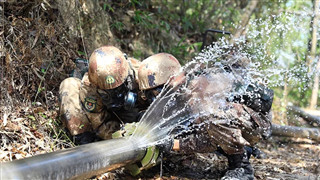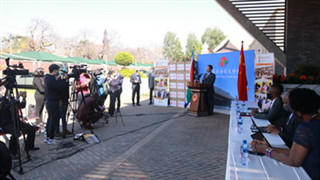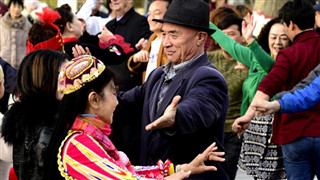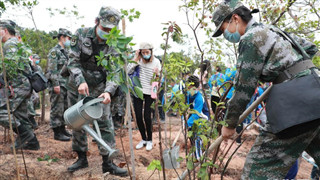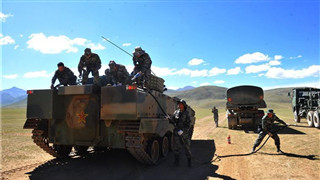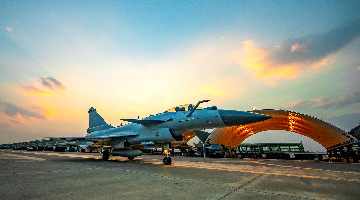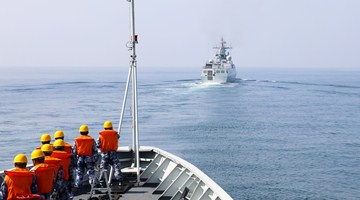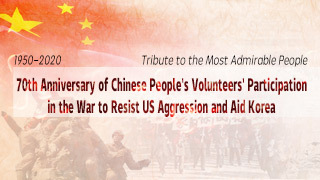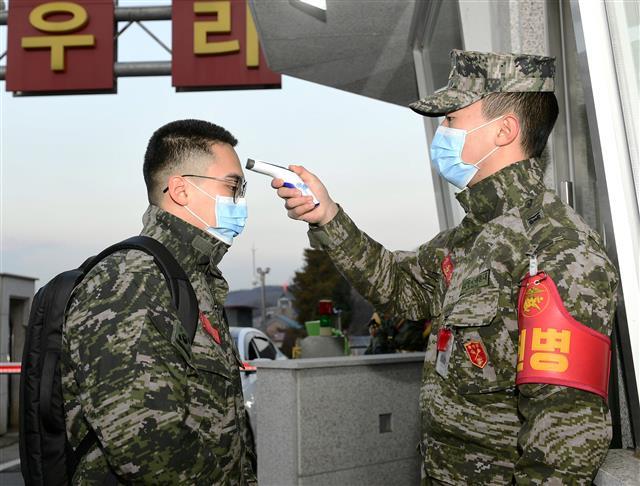
By Wang Ruoyu
As the COVID-19 pandemic sweeps across the world, several countries have reported confirmed cases in their militaries and tens of thousands of soldiers are quarantined. These will inevitably affect the military training and safety and lead to the delay or cancellation of many important military exercises.
Infections in militaries are related to the situation in their stationed areas.
Soldiers have close social contacts both in work and life, which is how the novel coronavirus finds its way to the barracks. As soldiers act in groups in a limited space most of the time, the virus, once on the move, is hard to control and will spread quickly.
Defense Ministry of the Republic of Korea (ROK) has kept updating the COVID-19 infections in its military. As of 10:00 am on March 10, 37 ROK soldiers had been infected, including two cured and 35 in treatment. There are currently 2,840 soldiers in quarantine, falling from a peak of 9,790 or so on March 2. Although the COVID-19 outbreak in China in late January sounded the alarm for the world, the ROK military didn’t take any preventive measures, but continued to allow soldiers to go out, take vacations and stay in close contact with the outside. On February 20, a ROK soldier returning from a vacation in Daegu to the naval base in Jeju was the first confirmed COVID-19 case in the military, followed by more confirmations in the army, navy and air force a day later.
Having realized how serious the epidemic was, the ROK military prohibited all service members from vacation, out-going, night out and home visit on February 22, but it was too late. The virus quickly spread in the military, driving up the number of infections and quarantines. ROK’s Defense Minister Jeong Kyeong-doo on February 25 ordered immediate quarantine and epidemic containment measures in armies with infection cases to stop the virus from further spreading. Given the severity of the situation, the ROK and the US announced to postpone their joint military exercise scheduled for early March, which Yonhap News Agency said was the first time that such an exercise was put off due to an epidemic.
The American troops stationed in the ROK are not immune to the high risk. The 30,000 troops stay in over 40 military bases across the ROK. Only a few of their families can live in the barracks while most have to rent apartments nearby. The American soldiers and their families have close contact with local society, largely increasing the risk of infection. On February 24, families of American soldiers were first confirmed of COVID-19 infection in Daegu, the eye of the epidemic storm, and the first American soldier was confirmed on February 26. There are seven confirmed cases in American bases in the ROK.
The Italian military hasn’t escaped the virus either as the country becomes the epicenter in Europe. The Italian army Chief of Staff General Salvatore Farina issued a statement on the afternoon of March 8 confirming his positive nuclei acid test and home quarantine. Previously an American sailor at the Naples naval base was confirmed, the first case in American troops in Europe.
The intensive COVID-19 infections in those troops might be due to the following reasons:
Firstly, the professional army system gives the service members much freedom. Most western countries implement the professional military system, in which their military officers and off-duty soldiers drive to work in a private car and get off work in time, just like in a private company. They seldom work overtime unless there is an emergency. They enjoy great liberty in their spare time and have close contact with society. As a result, troops are highly vulnerable if the local area is hit by the virus.
Secondly, no isolation or other protective measures are taken. In the ROK, for instance, service members, especially those from vacation, had their temperature taken when coming back to the barracks and could join their comrades in training and entertainment if the temperature was normal at the time. That allowed the virus to spread. Those members, particularly if they came back from a hard-hit area like Daegu, had to be put under a 14-day quarantine to effectively cut off the virus transmission.
Thirdly, participation in fighting the epidemic increases the chance of infection. With technological, personnel and equipment advantages, the military is a “trump card” in many countries’ efforts to fight the epidemic. After the COVID-19 broke out, ROK assigned military doctors and nurses to the frontline and antichemical troops to sterilize the main streets. Soldiers wearing masks were on duty in key areas. As Italy announced a national lockdown, their soldiers were sent to perform guard duty on the frontline too. The Iranian army formed the “jihadi base” and assigned antichemical contingents to sterilize hospitals and assist in street cleaning. When soldiers work on the frontline for a long time, especially if they work in highly dangerous areas, they may easily get infected.
Fourthly, participation in religious activities boosts the virus spread. Many western countries allow their military personnel to have religious beliefs and take that as an effective way of enhancing military cohesion and loyalty. They also allow soldiers to join large-scale religious events near the barracks. These events, which feature long duration, huge crowds and involve group chanting, largely increase the risk of infection.
Moreover, families and friends’ participation in religious activities also exposes the soldiers to the virus. Based at Chungcheongbuk-do, a soldier of the ROK army met with his girlfriend during vacation, who previously joined an assembly in Daegu organized by the Shincheonji Church of Jesus, where massive infections occurred. The girlfriend passed the virus to the soldier, who, after returning to the base from vacation, passed it on to his fellow soldiers who trained and lived with him.
The initial underestimation of the severity of the outbreak, the loose prevention and control measures and the social environment around the barracks have combined to make soldiers stationed in hard-hit areas victims of the pandemic.
Disclaimer: This article is originally published on guancha.cn, and is translated from Chinese into English and edited by the China Military Online. The information, ideas or opinions appearing in this article do not necessarily reflect the views of eng.chinamil.com.cn.

